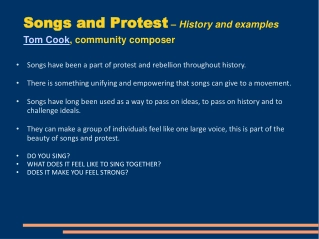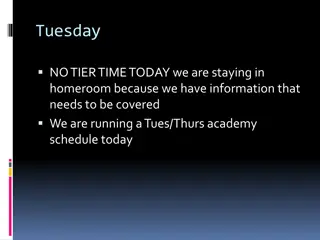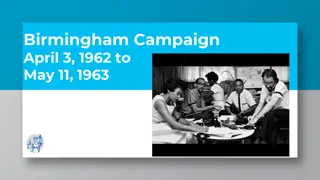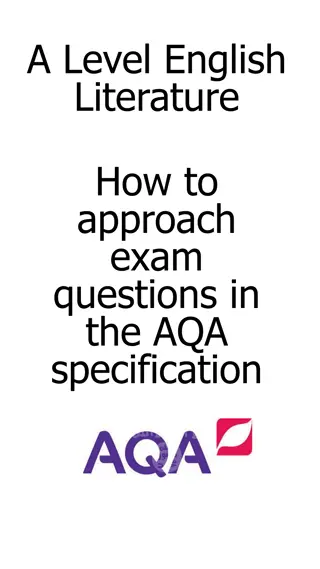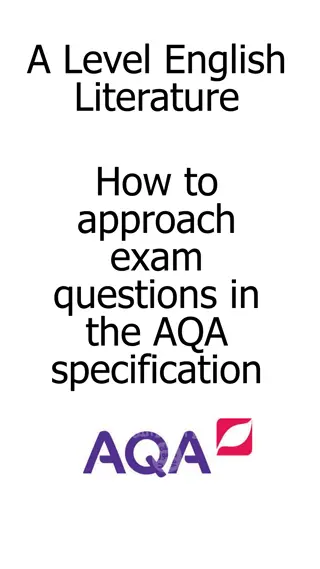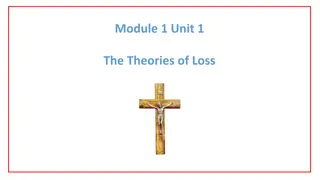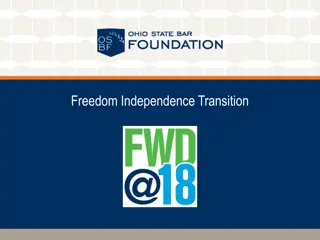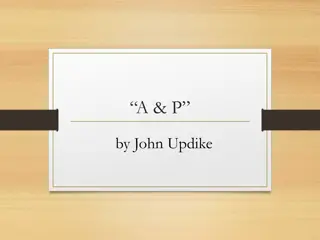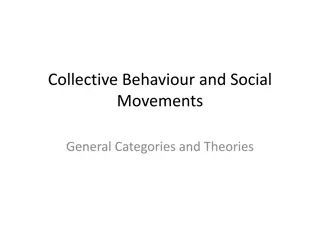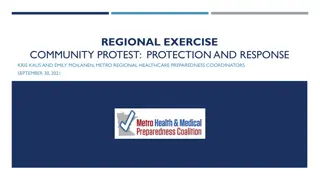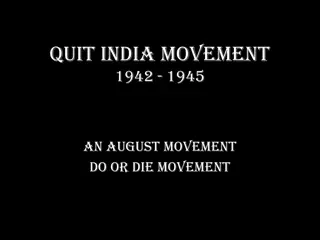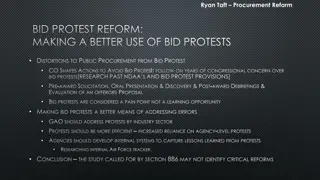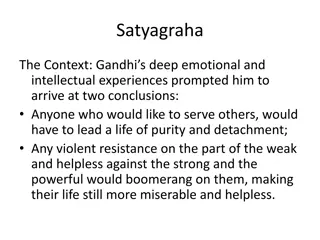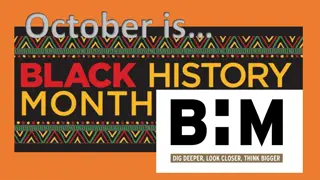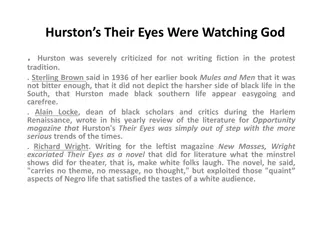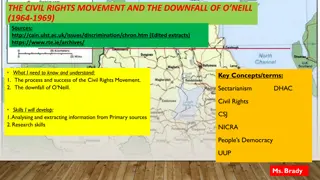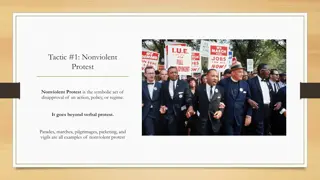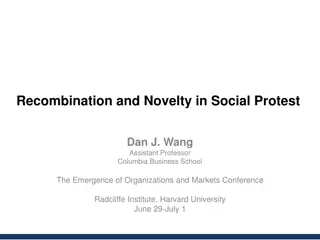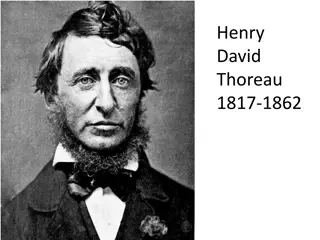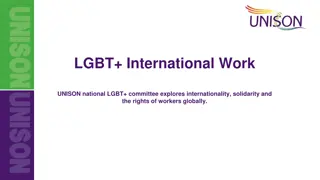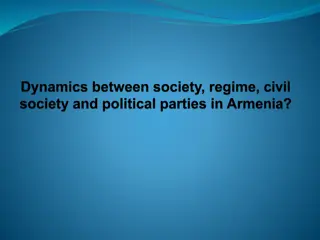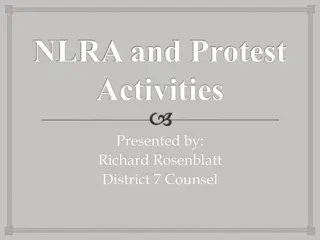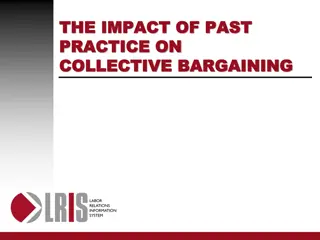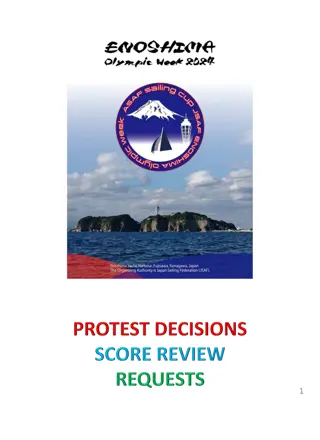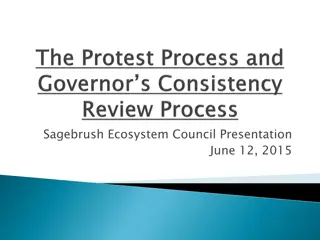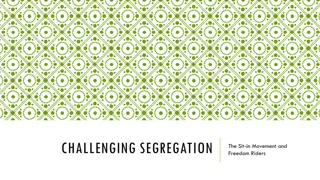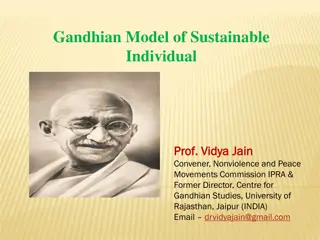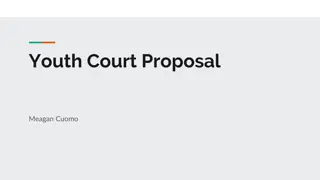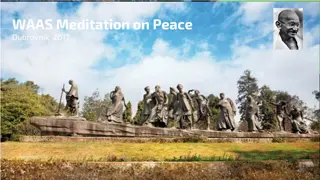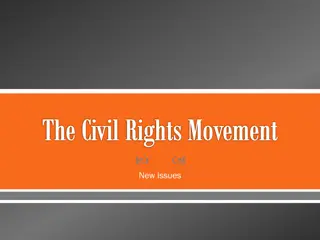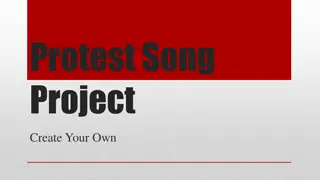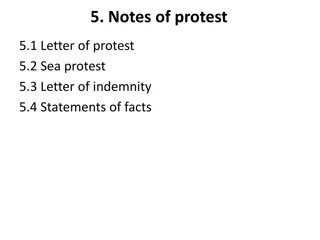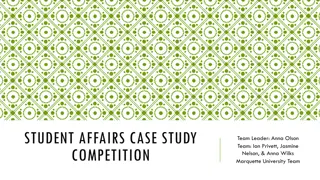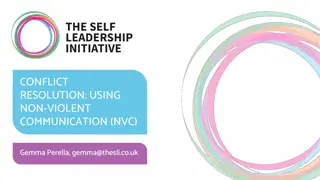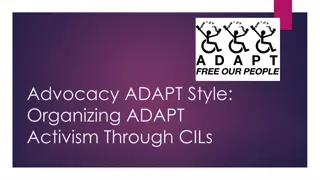Songs and Protest
Explore the deep-rooted connection between songs and protest throughout English history. From the traditional rebel song "The Cutty Wren" depicting the Peasants' Revolt in 1381 to the revolutionary actions of "The Diggers" in 1649, these songs have served as powerful tools for conveying dissent, cha
3 views • 12 slides
Understanding Nationalism: India's Road to Independence
Explore the journey of India towards independence, driven by the rise of nationalism under British colonial rule. Learn about key figures like Mohandas Gandhi and the Indian National Congress in the fight for equality and liberation. Discover the impact of nonviolent protests and the sacrifices made
0 views • 32 slides
The Birmingham Campaign: Fighting for Racial Equality in 1960s America
The Birmingham campaign, led by Dr. Martin Luther King Jr. and the SCLC, was a pivotal moment in the civil rights movement, aiming to end racial inequality through nonviolent protests and peaceful demonstrations. The efforts led to significant progress in desegregating public facilities and promotin
5 views • 8 slides
Exploring 'Kanthapura': A Journey into Indian Freedom Struggle through Literature
Indian author Raja Rao's novel 'Kanthapura' portrays the impact of Gandhi's freedom movement in a small village. The story follows Moorthy, a passionate follower of Gandhi, as he spreads the message of nonviolent resistance. This groundbreaking work blends traditional folk tales with modern literary
0 views • 12 slides
Approach to Exam Questions in AQA A-Level English Literature
Learn how to effectively approach exam questions in AQA A-Level English Literature focusing on the types of questions, especially in Paper 1 (Aspects of Tragedy) and Paper 2 (Social and Political Protest Writing). Understand the significance of Shakespearean extracts, explore tragic trajectories, an
0 views • 28 slides
Approaching Exam Questions in A Level English Literature: AQA Specification Overview
Explore how to approach exam questions in A Level English Literature following the AQA specification, focusing on question types such as Aspects of Tragedy and Social and Political Protest Writing. The guidance includes insights on interpreting Shakespeare extracts, understanding tragic trajectory,
0 views • 28 slides
The Theories of Loss and Bereavement: Understanding Grief Stages and Coping Mechanisms
Explore theories such as Bowlby's Attachment Theory, Murray-Parkes' theory of an Assumptive World, Peter Marris' Structures of Meaning, and Murray-Parkes Bereavement Model. These theories delve into the stages of grief, ranging from protest and despair to acceptance, offering insights into how indiv
0 views • 7 slides
Understanding Consent and Sexual Conduct Law
Exploring topics related to consent, sexual conduct law, and penalties. Covers aspects like age restrictions, marital laws, sexual assault, date rape, sexual battery, and the importance of clear consent. Emphasizes that lack of protest doesn't imply consent and provides insights on what constitutes
5 views • 27 slides
Analysis of Sammy in "A&P" by John Updike
In John Updike's "A&P," Sammy is depicted as a complex character who exhibits traits of boredom, insecurity, and impulsiveness. Various interpretations describe him as a typical American male with good intentions, insecure and unsure of himself, and a young, rash teenager. The story explores themes
0 views • 16 slides
Understanding Collective Behaviour and Social Movements: Theories and Examples
Collective behaviour involves voluntary and often spontaneous actions by a large group of people that defy societal norms, with examples ranging from panics and mobs to celebrations and riots. Conditions such as timing, social control breakdown, and structural strains can trigger collective behaviou
0 views • 26 slides
Metro Health Community Protest Exercise: Response and Preparedness
An exercise is conducted by Metro Regional Health and Medical Coalition to simulate a community protest scenario. The exercise involves training on protection and response strategies led by coordinators Kris Kaus and Emily Moilanen. Participants engage in various modules such as officer-involved sho
0 views • 11 slides
The Quit India Movement 1942-1945: An August Movement
The Quit India Movement, also known as the August Movement or Do or Die Movement, was a mass protest on nonviolent lines in India from 1942 to 1945. Initiated by the Indian National Congress, it called for an immediate end to British rule in India. Led by leaders like Mahatma Gandhi, the movement ai
0 views • 16 slides
Enhancing Bid Protest Procedures in Public Procurement
Research by Ryan Taft delves into the effectiveness of bid protests in shaping public procurement actions, emphasizing the need for improvements and increased efficiency. Suggestions include sector-specific approaches, agency-level protests, and enhanced lessons learned mechanisms.
0 views • 14 slides
Understanding Satyagraha: Gandhi's Nonviolent Resistance
Gandhi's concept of Satyagraha emphasized truth and nonviolence, leading to passive resistance against injustice. Rooted in purity and detachment, Satyagraha uplifts both the oppressed and oppressors, offering a dynamic and powerful means to confront evil without bitterness or revenge.
0 views • 6 slides
Indigo: A Story of Gandhi's Struggle for Justice in Champaran
Louis Fischer narrates the inspiring tale of Mahatma Gandhi's fight against the unjust practices forced upon the poor peasants of Champaran. Through nonviolent civil disobedience, Gandhi successfully challenges the exploitative British landlords, leading to a significant victory for the oppressed fa
0 views • 9 slides
The Mangrove Nine: Struggle for Justice in Notting Hill
The Mangrove Nine were nine individuals arrested in 1970 for incitement to riot during a peaceful protest outside the Mangrove restaurant in Notting Hill, London. Despite facing initial charges and a controversial trial, the case marked a significant moment in the fight for Civil Rights in Britain a
0 views • 4 slides
Right to Protest on High Seas: MV Mavi Marmara Case at ICC
The case of the MV Mavi Marmara, a vessel attempting to break the Israeli blockade of Gaza in 2010, raises questions about the right to protest on the high seas. The International Criminal Court is deliberating on this issue, distinct from the onboard fatalities. The UN HRC report emphasizes the dis
0 views • 7 slides
The Complexity of Narrative Voices in "Their Eyes Were Watching God
Zora Neale Hurston's novel "Their Eyes Were Watching God" faced criticism for not conforming to traditional protest literature styles. The narrative features a compelling protagonist, Janie Crawford, who defies stereotypes of black women in literature. Hurston skillfully employs a dual narrative sty
0 views • 8 slides
The Civil Rights Movement and Terence O'Neill's Demise (1964-1969)
The Civil Rights Movement in Northern Ireland, spearheaded by organizations like the Campaign for Social Justice (CSJ) and the Northern Ireland Civil Rights Association (NICRA), aimed to address widespread discrimination against Catholics. The movement advocated for electoral reform, an end to housi
0 views • 10 slides
Nationalism in India and Southwest Asia: A Historical Overview
The aftermath of World War I led to a surge in nationalism in India and certain Southwest Asian countries, as empires like the Ottoman Empire and the British Empire showed signs of weakening. Indian nationalism grew due to factors such as promises of reform by the British, religious divisions, and e
0 views • 15 slides
Strategies for Peaceful Resistance: Nonviolent Protests and Civil Disobedience
Explore tactics like nonviolent protest, noncooperation, nonviolent intervention, and legal action as peaceful ways to challenge actions, policies, or regimes. Learn about Gandhi's principles of civil disobedience and how to effectively engage in acts of resistance.
0 views • 5 slides
Recombination and Novelty in Social Protest: Insights and Implications
Exploring the concept of tactical innovation in social movements, this material delves into the dynamics of actors forging new relationships and transforming resources into novel ideas. It examines past explanations of tactical innovation and poses open empirical questions about novelty and tipping
0 views • 33 slides
Influence of Thoreau's Civil Disobedience on Gandhi and Martin Luther King Jr.
Gandhi's encounter with Henry David Thoreau's essay "Civil Disobedience" while in jail in South Africa sparked his implementation of nonviolent resistance called Satyagraha. This powerful concept of refusing to cooperate with injustices was adopted by Martin Luther King Jr., who considered Thoreau's
0 views • 22 slides
Promoting Solidarity and Rights of Workers Globally through International Trade Unions
Joining trade unions and engaging in international work is crucial for promoting solidarity, protecting workers' rights globally, and challenging exploitation by multinational companies. UNISON's National LGBT+ Committee is actively involved in international work, aiming to advocate for LGBT+ worker
0 views • 16 slides
Main Actors Society and Regime Characteristics Analysis
Analysis reveals a society characterized by passivity, apathy, and patron-client relationships, with emigration as a major form of social protest. The regime exhibits consolidating authoritarianism, convergence of business and political elites, and systemic corruption. Oligarchic dominance, small an
0 views • 6 slides
Understanding NLRA and Protest Activities Led by Richard Rosenblatt
Protected concerted activities lie at the core of Section 7, with specific focus on wages, hours, and working conditions. Recognizing strikes as a form of protected concerted activity is essential, distinguished by whether they pertain to unfair labor practices or economic reasons. The significance
0 views • 22 slides
Understanding the Impact of Past Practices on Collective Bargaining
Exploring the significance of past practices in interpreting, supplementing, and potentially contradicting contract language within the context of collective bargaining. Covering topics such as the definition of past practices, the duty to bargain, waivers of protest rights, and remedies for unlawfu
0 views • 35 slides
Protest Decisions at JSAF Enoshima Olympic Week 2024
A series of protest decisions were made during the JSAF Enoshima Olympic Week 2024 event. The first request was deemed invalid due to lack of party identification and incident details. However, the second request was upheld after a thorough hearing involving JPN 55 and JPN 4761. The decision highlig
0 views • 29 slides
Protest Procedures for BLM and Forest Service Planning Efforts
The protest procedures for planning efforts involving the Bureau of Land Management (BLM) and the Forest Service are outlined in this document. Key points include who can participate, filing requirements, and the process for protest resolution. The importance of addressing issues raised during the p
0 views • 18 slides
Nonviolent Resistance in the Civil Rights Movement
The Civil Rights Movement utilized nonviolent resistance methods such as sit-ins, bus boycotts, and protests to challenge segregation and fight for equality. Iconic figures like Rosa Parks and Martin Luther King Jr. played significant roles in inspiring change through peaceful means. The movement's
0 views • 6 slides
Gandhian Model of Sustainable Individual Behavior in the Globalized World
The Gandhian model of sustainable individual behavior, as advocated by Prof. Vidya Jain, emphasizes nonviolence, peace, and harmony in a world plagued by globalization, conflicts, and intolerance. Drawing on Gandhi's principles from Hind Swaraj, the paper explores how fostering nonviolent societies
0 views • 30 slides
Youth Court Proposal for Restorative Justice Program
Meagan Cuomo's Youth Court Proposal aims to offer a restorative justice alternative for nonviolent, first-time juvenile offenders, focusing on offenses like vandalism and truancy. The project involves research, community engagement, and creating connections with local schools to facilitate learning
0 views • 16 slides
The Inspiring Story of Gandhi's 1930 Salt March in India
Gandhi's 1930 Salt March in India was a powerful act of nonviolent resistance against British colonial rule. By defying the salt tax, Gandhi united millions of Indians and inspired a wave of civil disobedience that ultimately led to India's independence. This iconic event not only symbolized India's
0 views • 9 slides
Challenges and Evolution of the Civil Rights Movement
The Civil Rights Movement faced new challenges in the 1960s, with urban African Americans struggling with racism, economic disparities, and social issues. The Kerner Commission highlighted systemic racism, while incidents like the Watts Riot underscored ongoing tensions. The movement also saw a shif
0 views • 11 slides
Empower Through Protest: Create Your Own Song of Change
Engage in a unique Protest Song Project by exploring the significance of protest songs, analyzing the iconic "Fortunate Son" by Creedence Clearwater Revival, and crafting your own original piece. Explore the power of music in advocating for social, political, and school-related issues in a meaningfu
0 views • 4 slides
Understanding Letters of Protest in Shipping
Letters of protest in shipping are formal declarations used to record discrepancies, delays, damages, or misconduct in maritime transactions. They serve as a legal recourse to address issues such as cargo shortages, loading delays, or disputes between parties involved in shipping contracts. Learn ab
0 views • 29 slides
Evolution of Political Protests in Modern Russia: A Historical Overview
This article provides an in-depth analysis of the evolution of political protests in modern Russia from 1990 to present. It discusses the attitude of Russian journalists towards protests, basic concepts of political protest in modern political science, myths surrounding protests in Russia, and the f
0 views • 24 slides
Enhancing Campus Culture with Protest Protocol and Engaging Conversations
Addressing student concerns about voice, inclusivity, and social justice on campus, a comprehensive four-part plan has been proposed to foster open communication, safety, and empowerment. Current protocols for inviting speakers and handling protests are outlined, emphasizing freedom of expression wi
0 views • 15 slides
Effective Conflict Resolution Through Nonviolent Communication Techniques
Learn essential steps of Nonviolent Communication (NVC), such as making observations, identifying feelings and unmet needs, and requesting solutions or setting boundaries. Discover how to handle conflicts diplomatically and empathetically using NVC principles. Gain insights into active listening, as
0 views • 22 slides
ADAPT Activism: Empowering Disability Rights Advocates
ADAPT, a national grassroots community, engages in nonviolent direct action to ensure the civil and human rights of people with disabilities. This movement, led by individuals like Stephanie Woodward, plays a crucial role in shaping policies and advocating for accessibility and equality. Through sys
0 views • 35 slides
